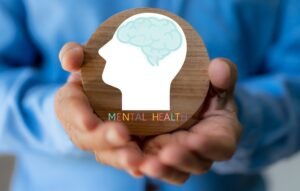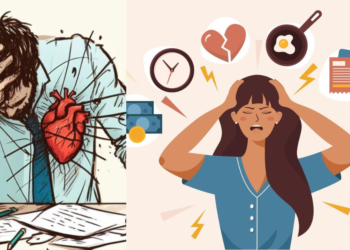Mental health pertains to our emotional, psychological, and social wellness. It influences our thoughts, emotions, and behaviors, and it matters in every phase of life.
Healthy mental well-being enables us to handle life’s pressures, recognize our strengths, learn effectively, perform at our best, and give back to our community. Mental health isn’t merely the lack of mental disorders; it represents a range, and everyone falls somewhere along that scale.
More than just lack of disorders
The WHO declares that mental health encompasses more than just the lack of mental disorders. Optimal mental health involves overseeing current conditions while promoting wellness and happiness. The organization highlights that maintaining and improving mental health is crucial for individuals, communities, and society as a whole.
ALSO READ: Stunning Research reveals how Mini-Robots can cure Sinusitis!
Every individual faces a certain risk of developing a mental health condition, irrespective of age, gender, income, or ethnic background. In the United States and many parts of the developed world, depression ranks among the primary causes.
Social and economic conditions, negative childhood experiences, biological elements, and existing health issues can all influence an individual’s mental health.

Limited financial resources or being part of a marginalized ethnic group can heighten the likelihood of mental health issues due to prejudices in the healthcare system.
When to seek help?
Sometimes it can be hard to tell when a concern about mental health signals a need for professional help. In certain situations, the answer is clear. But in others, it isn’t so obvious.
For example, if you’re afraid of giving a speech in public, does it mean you have a mental health condition or just a typical case of nerves? Or, when does shyness become a social phobia?

The Anxiety and Depression Association of America states that anxiety disorders are the most prevalent mental health disorders.
Individuals with these conditions experience intense fear or anxiety linked to specific objects or situations. Many individuals with an anxiety disorder attempt to stay away from situations that provoke their anxiety.
ALSO READ: Alarming! Experts reveal the Silent Dangers of Coronary Artery Disease
A psychiatrist, psychologist, clinical social worker, or another mental health professional may diagnose a mental health condition. A primary healthcare provider may also participate in diagnosing. A primary care provider might recommend seeing a mental health specialist.
Need more awareness
Mental health problems arise from a complicated interaction of biological, psychological, and social elements. Although there isn’t one definitive cause, genetics, personal experiences, and brain chemistry each contribute. Trauma, stress, and drug use can greatly elevate the risk.
Similarly, individuals who lack relevant genes or a familial background of mental health issues can still experience a mental health disorder.
Chronic stress and mental health issues like depression and anxiety can arise from existing physical health conditions, including cancer, diabetes, and chronic pain.
ALSO READ: Latest Studies Reveal Surprising Benefits of Daily Intake of Olive Oil
Despite the advancements in the general view of mental illness over recent decades, research indicates that stigma surrounding mental health remains strong, primarily influenced by media portrayals and insufficient education.
Additionally, individuals are prone to assign negative stigmas to mental health issues significantly more than to other illnesses and disabilities, including cancer, diabetes, or heart disease.














